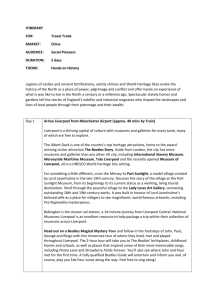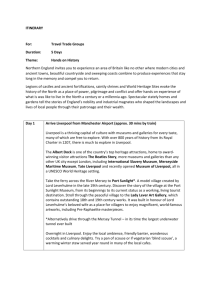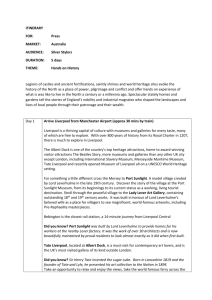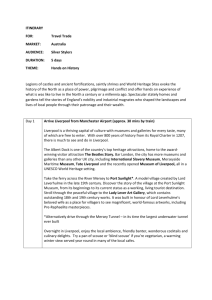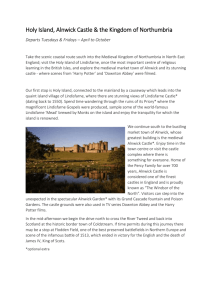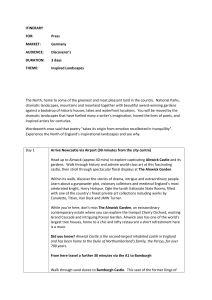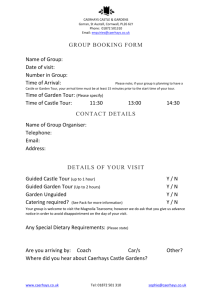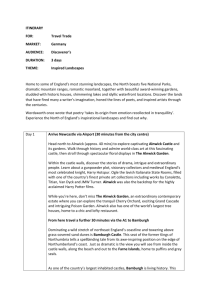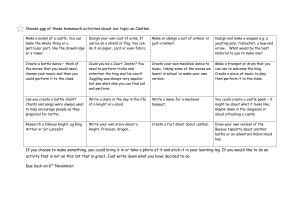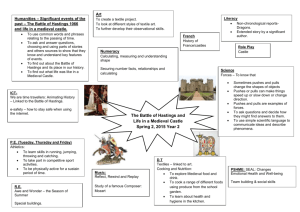xi. Hands on History (Word, 29KB)
advertisement
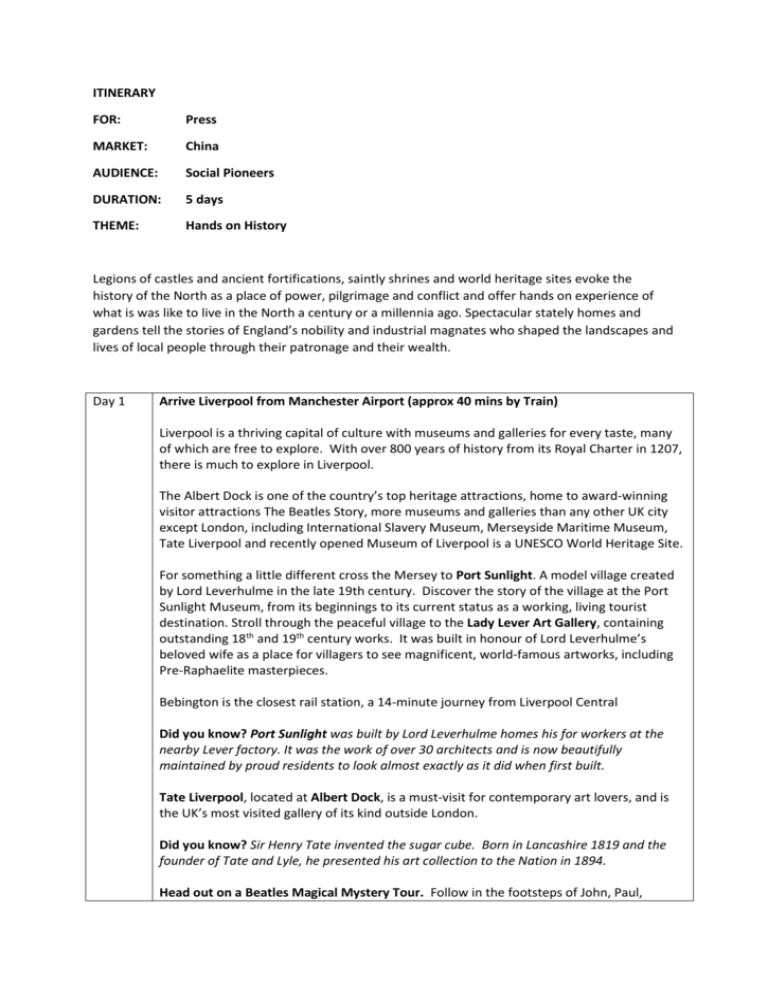
ITINERARY FOR: Press MARKET: China AUDIENCE: Social Pioneers DURATION: 5 days THEME: Hands on History Legions of castles and ancient fortifications, saintly shrines and world heritage sites evoke the history of the North as a place of power, pilgrimage and conflict and offer hands on experience of what is was like to live in the North a century or a millennia ago. Spectacular stately homes and gardens tell the stories of England’s nobility and industrial magnates who shaped the landscapes and lives of local people through their patronage and their wealth. Day 1 Arrive Liverpool from Manchester Airport (approx 40 mins by Train) Liverpool is a thriving capital of culture with museums and galleries for every taste, many of which are free to explore. With over 800 years of history from its Royal Charter in 1207, there is much to explore in Liverpool. The Albert Dock is one of the country’s top heritage attractions, home to award-winning visitor attractions The Beatles Story, more museums and galleries than any other UK city except London, including International Slavery Museum, Merseyside Maritime Museum, Tate Liverpool and recently opened Museum of Liverpool is a UNESCO World Heritage Site. For something a little different cross the Mersey to Port Sunlight. A model village created by Lord Leverhulme in the late 19th century. Discover the story of the village at the Port Sunlight Museum, from its beginnings to its current status as a working, living tourist destination. Stroll through the peaceful village to the Lady Lever Art Gallery, containing outstanding 18th and 19th century works. It was built in honour of Lord Leverhulme’s beloved wife as a place for villagers to see magnificent, world-famous artworks, including Pre-Raphaelite masterpieces. Bebington is the closest rail station, a 14-minute journey from Liverpool Central Did you know? Port Sunlight was built by Lord Leverhulme homes his for workers at the nearby Lever factory. It was the work of over 30 architects and is now beautifully maintained by proud residents to look almost exactly as it did when first built. Tate Liverpool, located at Albert Dock, is a must-visit for contemporary art lovers, and is the UK’s most visited gallery of its kind outside London. Did you know? Sir Henry Tate invented the sugar cube. Born in Lancashire 1819 and the founder of Tate and Lyle, he presented his art collection to the Nation in 1894. Head out on a Beatles Magical Mystery Tour. Follow in the footsteps of John, Paul, George and Ringo with this immersive tour of where they lived, met and played throughout Liverpool. The 2-hour tour will take you to The Beatles' birthplaces, childhood homes and schools, as well as places that inspired some of their most memorable songs, including Penny Lane and Strawberry Fields Forever. You’ll also see where John and Paul met for the first time. A fully qualified Beatles Guide will entertain and inform you and, of course, play you Fab Four tunes along the way. Feel free to sing along! The tour finishes at the legendary Cavern Club, where you can present your ticket for an exclusive souvenir of your trip and enjoy live music most afternoons and evenings. Overnight in Liverpool is a must to enjoy the local ambience, friendly people, wonderous cocktails and culinary delights. Head to the Cavern and see where the Beatles first played in their 60s heyday. Day 2 Arrive Lake District and take a tour of Beatrix Potter's Lake District Mountain Goat offer superb minibus tours of the Lake District – discover much-loved author Beatrix Potter’s favourite countryside on a half-day trip. Your tour visits Hill Top, the house belonging to Potter (author of The Tale of Peter Rabbit) whose picturesque rural location inspired many of her best-loved characters. Then explore Hawkshead, a scenic village where Wordsworth once studied. The landscapes are picture-perfect, and a photo stop at Tarn Hows is a must, before the tour continues onto Coniston Water for a lake cruise. You’ll pass through pretty Yew Tree Tarn, a small lake, and Skelwith Bridge, a cute village, and have the option to finish with a quintessentially English cream tea at Lindeth Howe Country House Hotel, the former home of Beatrix Potter’s mother on the edge of lake Windermere, before returning to your accommodation. Overnight Lake District Day 3 Continue your journey to Hadrian’s Wall Explore Hadrian’s Wall by bike, bus, on foot or with a guided tour from Carlisle. The 80-mile (129-km) corridor that is Hadrian’s Wall represents the most significant monument built by the Romans in Britain. It stretches across the very top of England, and you can explore it in an exciting variety of ways. Enjoy a run or a walk on the Hadrian’s Wall Path National Trail and take in breathtaking scenery of the rolling fields, moorlands and nearby historic sites, such as 13th century Lanercost Priory. If you’re a keen cyclist, ride the challenging slopes along the Hadrian’s Wall Cycle Way. Go the whole distance, and you can enjoy the two cities of Carlisle and Newcastle with quiet country lanes in between. Alternatively try the ‘Emperor Hadrian, Reivers and Edward 1st 'Longshanks' Tour’. Expert guides escort you around the key sites in North Cumbria experiencing Hadrian's Wall, the homes of the great 'reiver' families and historical medieval sites such associated with Edward 1st last days There’s also a bus – aptly named the AD122 (when the Wall was constructed) – that runs the length of the wall, taking in forts, museums, towns and villages. Head over to Newcastle on the A69 (1hr 20mins) for an overnight stay enjoying the delights of Newcastle’s waterfront and seven bridges, famous local ales, produce and the famous Geordie welcome. Day 4 Explore captivating Alnwick Castle and its gardens along the A1 (approx 45 mins) Walk through history and admire world-class art at this fascinating castle, then stroll through spectacular floral displays at The Alnwick Garden. Alnwick Castle, the secondlargest inhabited castle in England, has been home to the Duke of Northumberland’s family, the Percys, for over 700 years. Within its walls, discover the stories of drama, intrigue and extraordinary people. Learn about a gunpowder plotter, visionary collectors and medieval England’s most celebrated knight, Harry Hotspur. Ogle the lavish Italianate State Rooms, filled with one of the country’s finest private art collections including works by Canaletto, Titian, Van Dyck and JMW Turner. While you’re here, don’t miss The Alnwick Garden, an extraordinary contemporary estate where you can explore the tranquil Cherry Orchard, exciting Grand Cascade and intriguing Poison Garden. Alnwick also has one of the world’s largest tree houses, home to a chic and lofty restaurant, a cup of tea here is sure to be fun. Did you know? Alnwick Castle is the second-largest inhabited castle in England and has been home to the Duke of Northumberland’s family, the Percys, for over 700 years. Once refreshed head up to Bamburgh Castle on the scenic coastal route via the B1340 Bamburgh Castle is one of England’s most iconic landmarks. It dominates a wild stretch of northeast England’s coastline, towering above grass-covered sand dunes. Just as dramatic is the view you will see from inside the castle walls, along the beach and out to the Farne Islands, home to puffins and grey seals. As one of the country’s largest inhabited castles, Bamburgh is living history. This site has been occupied since prehistoric times, witnessing bloody battles, royal rebellion and secret negotiations. The imposing keep was built to survive raids in the 12th century, while the King’s Hall is a Victorian masterpiece made for elaborate banquets and balls. And every summer, Bamburgh reveals more of its past in live archaeological excavations. Did you know? Bamburgh’s filming pedigree dates as far back as 1927 with films including Ivanhoe (Elizabeth Taylor); Robin Hood; Elizabeth and MacBeth all filmed here. Alnwick was the backdrop for the highly acclaimed Harry Potter films Day 5 From Newcastle head to York (approx 1hr 50mins) and travel back 2,000 years at revealing York Minster One of the world’s loveliest Gothic cathedrals and certainly England’s biggest, York Minster dominates the city below it and houses countless treasures in its atmospheric depths. Venture down into its underground chambers to find the new attraction called Revealing York Minster. Here you can explore clever interactive galleries combining ancient craftsmanship, recent excavations and cutting-edge science to tell the site’s 2,000-year history. Follow in the footsteps of Roman soldiers and see their excavated barracks. Discover why York claims to be the birthplace of Christianity in Europe. Admire a Viking lord’s 1,000-yearold carved elephant tusk, and explore ancient illuminated manuscripts. Upstairs, gaze on the world’s largest medieval stained-glass window, often called the English Sistine Chapel, then climb the narrow twisting staircase to the parapet and experience the sensational views. The cathedral is a short walk across the river from York Enjoy a bird's-eye view of the city and stroll along its 13th century defensive city walls, passing historic landmarks, gatehouses and gardens. The ancient fortifications that encircle York’s historic centre are the longest and most complete city walls in England. Walk along their superbly preserved ramparts and it’s easy to imagine yourself as a patrolling Roman guard, medieval archer or a soldier dodging cannonballs during the Civil War. First built in Roman times around 71 AD, then largely replaced by medieval stonework, the walls stretch for over 2 miles (3.4km). It takes about 2 hours to walk the full circuit. The high stone parapets give amazing views of the cathedral, labyrinthine medieval streets and beautiful gardens of historic York below and five gatehouses or ‘bars’ and 45 towers dot the walk. They include the Roman-built Multangular Tower and the ceremonial Micklegate Bar, through which kings and queens entered the city, but also where traitors’ severed heads would be skewered on pikes. Travel back in time along one of Europe’s best-preserved medieval shopping streets, with cheerful cafés and quirky shops in timber-framed buildings. Once voted ‘Britain’s most picturesque street’, The Shambles is a shopping destination like no other. It is a curiously quaint, flag-stoned avenue overhung haphazardly by timber-framed houses dating from the 15th century. Did you know? The Shambles was once lined with butchers’ shops and was made narrow by design to keep the meat out of direct sunlight. Most properties still have exterior wooden shelves, which are reminders of when cuts of meat were served from the open windows. Today, the beautifully restored buildings house an appealing mix of shops and places to eat. Smell the delicious aromas wafting from chocolatiers, fudge-makers and cafés, and browse unique jewellery, leather goods, woollens, curiosities and antiques in old-fashioned shop fronts.
